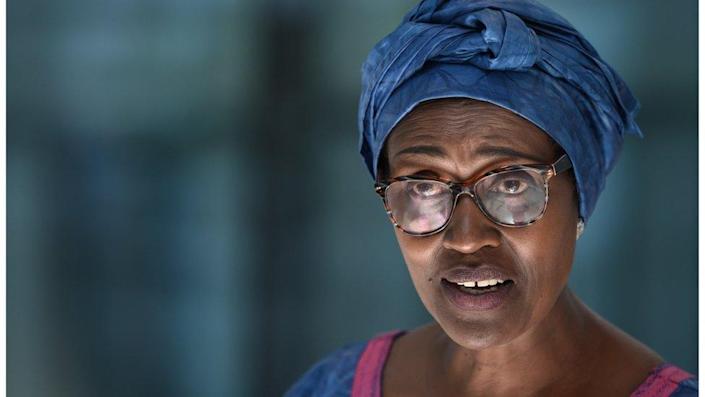
The head of the UN Aids agency, Winnie Byanyima, has spoken for the first time about her experience of sexual assault and harassment.
“I was shocked, I was 18… This was an attempted rape,” Ms Byanyima said.
She told the BBC’s Desert Island Discs programme she had never shared the story but it was a “defining” one.
She said as a university student in Kampala in 1977, a lecturer went to her room and said if she became his girlfriend she would pass his exams.
Ms Byanyima recalled she was “a confident little girl”.
“I said: ‘I don’t need any help’ and I asked him to leave.”
‘No word for abuse’
She informed her parents, who thought she could not spend her university years being “blackmailed” and said she should leave.
At the time, Uganda was under the rule of dictator Idi Amin. A family friend was on good terms with some generals, so he offered to help with her travel papers. Arrangements were made for her to go with him to the ministry of education.
But he never took her to the ministry of education as he had promised. Instead, he drove her to his apartment, pretending he had forgotten something.
“We got to his apartment, he put on some music on his player. The song was The First Cut Is The Deepest and he came to grab me,” she recalled.
“I screamed, he was embarrassed, he stopped, put me in the car and dropped me back at the university and said I was stupid, I was childish. ‘These things happen’. He called it: ‘Things happen’.
“I was shocked, I was 18. I had never had a relation with a boy. This was an attempted rape.
“At that time, there wasn’t even a word called sexual harassment or abuse. There was rape, but you felt ashamed to admit,” the UNAids chief recalled.
She managed to get to the UK but upon arrival, she could not tell immigration officers what had happened to her.
“I mentioned my cousin who’d been killed. I said I feared for my life. But I couldn’t say there was an attempt to rape me or abuse me sexually several times. It was too shameful,” she said.
Life under Amin
She returned to Uganda and became an MP before spending several years at the African Union and the UN. In 2013, Ms Byanyima became head of Oxfam International. At the time the charity was embroiled in a sexual misconduct scandal, which happened before her time at the helm of the organization.
“The one time I broke down during that crisis, was during a radio interview by a Canadian journalist, who attacked me very hard,” Ms Byanyima said.
“I was trying not to be defensive, to say I understand the pain of sexual abuse.
She didn’t tell him about her personal experience “but in my heart it was there”, she said.
“After the interview I cried because, I know the pain, or I knew it, and it all came back. That is why I couldn’t but apologise. I couldn’t defend staff, I defended the one who was abused.”
Ms Byanyima also spoke of her childhood under Amin “seeing death, seeing violence”.
“At school, when families would come to pull a girl out of class and take her away and then she’d come back after a week with her head shaved and in mourning.
“Then we would know that her father has been killed or disappeared and we couldn’t talk about it,” Ms Byanyima said.
“People would bury their dead at night because you have to pretend nobody has died. Because, if you do speak about it or show it, then they would come for you too,” she added.
As an engineering student in Manchester in the late 1970s, Ms Byanyima campaigned against Amin and later went on to join a rebel group.
“Being part of movements helped me channel my anger and to feel that I am with others, I think that saved me,” she added.
She was appointed the head of UNAids in 2019.




